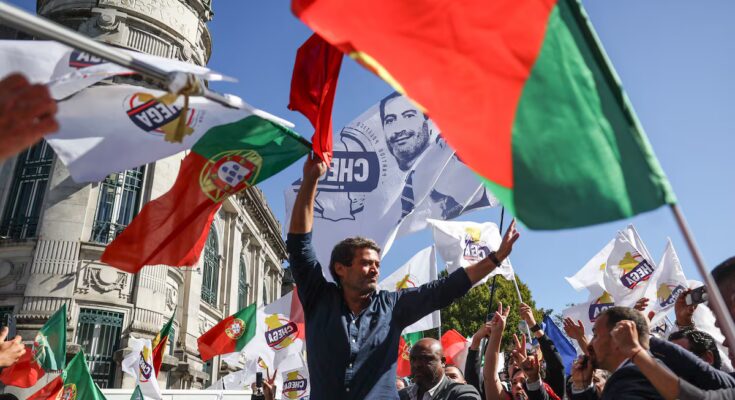Chega is a religion and André Ventura, its prophet. Inside Chegathe book that the journalist Miguel Carvalho published in Portugal (750 pages, over a hundred interviewees, five years of research) by the Objectiva publishing house, is an exhaustive portrait of the most powerful extremist political project in the history of Portuguese democracy. Chega was born in 2019 to André Ventura, a politician disillusioned with his life in the moderate Social Democratic Party (PSD), and several friends who no longer accompany him. In two months, seven editions and 30,000 copies were launched, six times the best-seller considered in Portugal.
Founders like Nuno Afonso or the jurist Fernanda Marques Lopes (cards 2 and 3) fell into oblivion after losing some bloody internal wars with other factions that wanted control over the leader and the party. Also because Ventura doesn’t want long shadows over himself. In these skirmishes, threats, illegal registrations, fake accounts on the networks and other tricks were used. The most disturbing thing is to note that the information about the dirty laundry does not come from political opponents. “90% of the book is Chega talking about Chega, a portrait of the party made by those who are or were inside and the majority do so in ON (agreeing to be summoned)”, underlines Carvalho (Oporto, 54 years old), who manages to interview militants who hate him and attack him online.
In just seven years, the party has become a serious contender for the governorship with a recipe that could be summed up like this: fluctuating political program, disproportionate television presence, digital hyperactivity and winks at those who resent the system. In that period we went from just one deputy in the Assembly of the Republic to 60 in the May elections. It is the main opposition group and therefore its dream of replacing the ruling AD coalition in the future is no longer a pipe dream.
Before facing this test, Ventura will measure his social support in the presidential elections to be held on January 18. It will be his second attempt to assume the position of head of state. In the first, in 2021, he received almost half a million votes, despite Chega taking his first steps. Now he has achieved several historic results – the main one being the elimination of the Socialist Party as the main opposition force in the Assembly – and the former Benfica TV commentator has a chance of progressing to the second round. «He is the politician who best consolidates his voters and has a divided left in front of him», observes the journalist during an interview in Lisbon.
Carvalho’s book does not try to divine the future, but rather to illuminate the recent past and understand the roots of the splendor that the far right is experiencing in a country that half a century ago impressed the world with the Carnation Revolution. “There is the town of Ventura, people who feel that the State has abandoned them and that they lack services. They feel that for the first time they have a voice that protests for them and shouts for them”, reflects the journalist. Marine Le Pen summed it up at an event in Lisbon: “Chega is a cry that comes from the heart.” The emotional bond explains why modest people sacrifice themselves to finance a project that aspires to found the Fourth Republic, “that of the good Portuguese”, even if some of its representatives have pending matters with the justice system or are involved in scandals such as the theft of suitcases at the airport or incitement to child prostitution.
Funding is one of Chega’s problems, along with its inability to become an organization with internal rules that comply with the law. The Constitutional Court has overturned the training statute on four occasions. “In a certain sense it operates with illegal bodies. TC has warned about the lack of internal democracy, it is a party that has transformed into a cult of the leader and a project of personal power”, explains the journalist, threatened by his investigation.
Carvalho illuminates the dark areas behind the money, from the evaporation of electoral funds to the contributions of the traditional oligarchy, such as the members of the Mello or the Champalimaud, sagas who benefited during the Estado Novo and were persecuted during the revolutionary fervor after the fall of the dictatorship on April 25, 1974. His animosity towards the spirit of April is shared with André Ventura, who often attacks the date of the arrival of freedom in the country, even if He proclaims himself democratic. “Ventura makes an anti-elite speech, but some elites finance him and he makes an anti-system speech, but the system lies in his financing. It is an almost schizophrenic contradiction”, says the journalist.
His electorate does not seem to care about the contradictions or lies of the founder, who alters promises according to need and even defends what he does not believe in to make noise. “André turned out to be a Saúl and not a David. He is a great actor,” Lucinda Ribeiro, an evangelical computer scientist largely responsible for the party’s rapid digital expansion in its early days, says in the book. “Chega went to his head. He was humble, funny and suddenly he had chants, people standing to applaud him, companions,” compared activist Patrícia Sousa Uva. Nuno Afonso, Ventura’s former friend and former chief of staff, says he told him this: “I want people to go to sleep thinking about me and wake up thinking about me.”
Nuno Afonso was a person so close to Ventura that he knew of his previous dreams of becoming a writer or president of Benfica. “Before he said that Eusebio spoke in his ear, now he says that he is God to maintain the idea of being an envoy. His messianism is becoming more and more accentuated”, says Miguel Carvalho. Much of the party’s success depended on the personality of its leader. Ventura, a law graduate and tax inspector, discovered a histrionic streak when he became a television commentator. It was the perfect school for the style he has shown since 2019 with boxing oratory always on the attack. He imposed his political agenda (immigration and the precariousness of citizens are now at the forefront of the government) and his message of victimization towards the media, which he reproaches for their hostility towards Chega. A few days ago he left the studios of CNN Portugal, irritated by the questions.
The truth is that Portuguese private television stations have contributed to the expansion of their profile as much as to the dynamism of the networks. If the latter allowed him to attract young people, the former introduced him to the humblest homes, where he had long stopped believing in politicians. Between 2019 and 2024, Ventura was interviewed almost twice as often as opposition leaders and Prime Minister Luís Montenegro (56 versus 32). The peak of the paroxysm occurred in the last campaign, when the mobile units broadcast live the chase of the car that was taking Ventura to the hospital after he suffered two minor ailments.
Chega responds to the “Trojan horse” tactic that infiltrates dynamite democracy, as Donald Trump’s presidency in the United States is demonstrating. But Miguel Carvalho believes that the models of Hungary or Brazil are more influential among the Portuguese far right, which belongs to the Patriots for Europe family: “From the United States they imitate crime, but they are closer to Viktor Orbán.”



